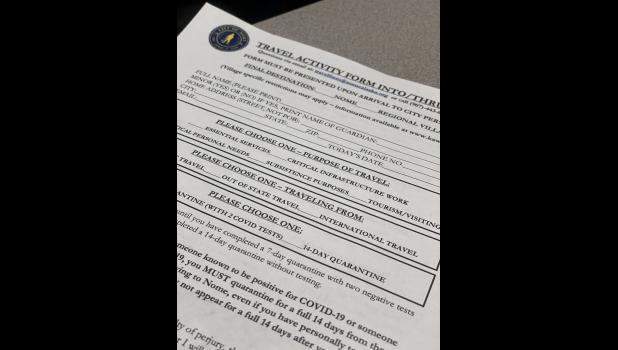Travel forms stay in place as travel-related COVID-19 cases increase
This week saw another surge of COVID-19 cases in the region, the majority of which have been tied to people traveling from Anchorage.
Despite the rising rates of infection across the state, travel into the region continues to climb, and both Alaska and the City of Nome have doubled down on their travel restrictions in an attempt to curb the spread.
Glenn Steckman, Nome’s City Manager, said the difference in the number of travelers from the beginning of the pandemic to now was striking. “Back in the beginning, we were only seeing 30 to 50 people flying a week. That’s how much air traffic dropped in this area,” he said. “Now we’re looking at 450 to 500 passengers a week. There’s a lot of movement starting to happen.”
Alaska Airlines has stopped selling middle seats on their daily weekday flights into Nome, but Steckman said that most of the available window and aisle seats on incoming flights are full. Alaska Airlines will also resume weekend flights on Labor Day weekend, which is anticipated to increase incoming travel even further.
All travelers flying into Nome, even if they’re passing through the city directly to a regional village, must fill out a travel form specifying where they’ve been, where they’re going, and where they will spend their mandatory quarantine. Steckman said that some days only 10 percent of incoming travelers have it. “We’re not sure why people all of a sudden decided they did not need travel forms,” he said.
Most people are willing to fill out forms when they arrive, but Steckman said there have been a small number of instances where people have refused to fill out the form. While a police officer is stationed at the airport, Steckman said the City is not forcing travelers to sign anything. “We’re looking more for an education process than an enforcement process,” he said.
All incoming travelers, except those passing through Nome directly to regional villages, are required to quarantine either for seven days with COVID-19 testing on the first and eighth day or for 14 days with no testing. Steckman said that 80 to 90 percent of travelers opt for the seven-day quarantine with testing.
Early in the pandemic, the City would check in with travelers to make sure they were obeying the quarantine requirements, staying inside their homes and not coming into contact with other people, but those check-ins have stopped. “Some in the community did not want that, so we backed off,” Steckman said.
Now, when the City receives reports of people violating their quarantine, city employees reach out to the individuals – and their employers, when relevant – to educate them about the importance of maintaining strict quarantines. But the City cannot force people to stay inside. “As has been accused occasionally, we don’t run a police state up here,” Steckman said. He pointed out that even without strict enforcement, Nome has been able to catch incoming COVID-19 patients before significant community spread took place.
Steckman said the rules also keep some people from traveling to Nome altogether. “We’ve had one person just recently fly up here, didn’t want to sign anything, didn’t want to follow the quarantine, and got right back on the plane to fly back out,” he said. “In the beginning, we had that on a couple different occasions.”
As for who all the new travelers are, Steckman said it’s been a mix. Engineers and construction workers have been coming in for a number of City projects, the hospital and the new courthouse. He also mentioned a recent influx of teachers coming through Nome, many of whom go on to regional villages, as well as an uptick in people coming up to visit family and enjoy the last few weeks of summer.
Paul Kosto, executive director at the Nome Chamber of Commerce, said that travel rules for the most part have not prevented businesses from bringing workers to Nome. This has especially been the case because people deemed “essential workers,” such as those working in construction, can get right to work without quarantining as long as they wear a mask and stay away from public places. “It’s a workable program that’s not keeping businesses from getting business done in Nome,” he said.
Meanwhile, the state has revised its rules for incoming travelers amid an alarming increase of case numbers statewide. While Alaska residents can still get free testing when they arrive from out of state, nonresidents who want to test at Alaskan airports must pay a fee of $250. Testing at the airport is required unless the visitor has proof of a negative test taken 72 hours before departing for Alaska.
“The State wants to strongly incentivize testing before travel for nonresidents, and with that we expect to reduce the number of travelers who test positive for COVID-19 after arriving into Alaska,” said Clinton Bennett, communications director for the state’s Office of the Commissioner.
For travelers who refuse to follow testing and quarantine protocols, Bennett said “we are asking our airport contractors to collect the name and contact information for the traveler and provide it to DHSS for follow up.” But he also said that so far, no one arriving in Alaska has outright refused to follow the testing protocols.
Alaska Airlines has also ramped up the strictness of their pandemic prevention policies. Travelers who refuse to wear a mask at any point during their trip, including in the terminal and baggage claim, can now be permanently banned from flying with the company. Tim Thompson, Alaska Airlines’ manager of public affairs, said that some passengers have already been banned for not wearing a mask.
In Nome, Steckman said the City is redoubling its efforts to educate people about the importance of testing and quarantining with a new campaign of public service announcements.

